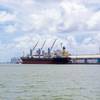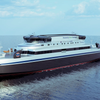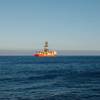The American Association of Port Authorities (AAPA) announced it is disappointed that the Bush Administration has proposed still another annual budget that would significantly underfund the Department of Homeland Security's (DHS) Port Security Grant Program and the portion of the U.S. Army Corps of Engineers' Civil Works Program that provides crucial navigation access to ports. While the Administration did increase its funding request for a key program that provides incentives to reduce diesel emissions from trucks and other equipment, the increase is far below what Congress authorized for the program.
The Administration's budget request calls for a 7.6 percent overall increase in DHS's budget in fiscal 2008, but recommends a huge decrease for port facility security. In its proposed fiscal 2009 budget, the Bush Administration recommends the Port Security Grant Program-the only federal program that assists public ports to fund marine facility security improvements-receive $210 million in Congressional appropriations. This is the same amount the Administration recommended in its fiscal 2008 budget, even though both the Administration and Congress authorized $400 million for the program in the 2006 SAFE Port Act and both approved a $400 million appropriation for port security grants in the fiscal 2008 omnibus appropriations bill.
For more than five years, AAPA has urged the Administration and Congress to annually fund the Port Security Grant Program at the $400 million level. This funding level is especially important to ports since they are in the process of implementing the federal Transportation Worker Identification Credential (TWIC) program, with its associated costs such as installation of technology to read TWIC cards.
With regard to navigation funding, Mr. Nagle said the ports association is also disappointed with the Administration's fiscal 2009 budget request calling for no increase in the Corps of Engineers' budget to pay for maintaining America's federal navigation channels. He said that while at least $1.3 billion in funding from the federal Harbor Maintenance Trust Fund is needed just to maintain federal navigation channels, the Administration's budget calls for only $729 million, which is $6 million less than it requested for fiscal 2008.
"On the bright side, the Administration is asking for $14 million more than last year for navigation dredging studies and deep-draft construction, which would be helpful to ports trying to accommodate the needs of today's larger ships," said Mr. Nagle.
On the issue of air quality, the Administration's funding request for the Environmental Protection Administration to implement the Diesel Emissions Reduction Act (DERA)-which provides grants to entities like ports and school bus owners to help reduce pollution from older diesel engines-comes in at $49.2 million. This represents a significant increase over last year's $35 million budget request and is only slightly less than the $50 million Congress appropriated in fiscal 2008. While AAPA does not agree with the budget's proposal to restrict funding only to areas of the country in non-attainment for air quality standards, Mr. Nagle said the association supports the Administration's request for increased appropriations, noting that AAPA's goal is to reach an annual funding level of $200 million, which the 2005 DERA legislation authorized.
"Our nation's economy, environment and national defense depend largely on how well we can ensure deep-draft shipping access to our seaports, protect them against terrorism and keep our air clean," Mr. Nagle remarked. "While this year's budget request for seaport-related programs is certainly below what we had hoped, it isn't radically cut from last year and in some areas is increased. We hope that, by continuing to advocate for these vital programs, the Administration and Congress will agree to fund them at the levels AAPA recommends."
The American Association of Port Authorities was founded in 1912 and today represents 160 of the leading public port authorities in the United States, Canada, Latin America and the Caribbean. In addition, the Association represents 335 sustaining and associate members, firms and individuals with an interest in the seaports of the Western Hemisphere. AAPA port members are public entities mandated by law to serve public purposes. Port authorities facilitate waterborne commerce and contribute to local, regional and national economic growth. The benefits of ports are immense for national economies throughout the Western Hemisphere. These ports are gateways to world trade and are a critical component in these nations economic health, national defense, and growing cruise industry. In the U.S., commercial seaport activities provide jobs for 8.4 million Americans, whose earnings and consumption totaled $314.5 billion in 2006.
Sponsored Content
Chris-Marine’s solutions help to prolong engine lifetime

Subscribe for
Maritime Reporter E-News
Maritime Reporter E-News is the maritime industry's largest circulation and most authoritative ENews Service, delivered to your Email five times per week









